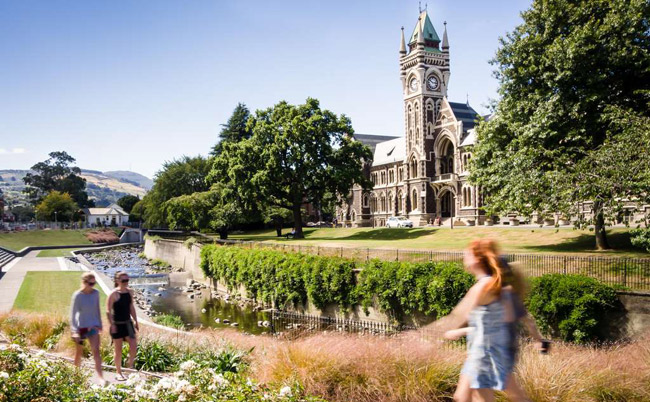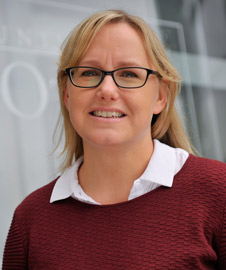Thursday 8 November 2018 8:14pm

The University of Otago will receive $28.5 million (excluding GST) for 41 world-class projects in the latest Marsden Funding round.
The University of Otago has secured not only the most funding from this year’s Marsden Fund grants, but also the highest number of grants awarded to any research organisation since the fund began in 1994.
The University will receive $28.5 million (excluding GST) for 41 world-class projects, up from $24 million for 33 projects last year.
"This is testament to the exceptionally hard work put in by research and professional staff to ensure their world-leading research ideas are expressed in the most compelling way possible."
In an analysis by Dave Guerin, Editor of Tertiary Insight, it shows seven universities gained funding and secured 93.8 per cent of the $85.6 million awarded nationally, which is a similar share to previous years. Three Crown Research Institutes and two independent research organisations also received awards and a full list of the successful 2018 Marsden Fund projects can be found here.
Deputy Vice-Chancellor (Research and Enterprise) Professor Richard Blaikie says this is a significant achievement for Otago researchers as there is huge competition for the funding, with applications usually coming from the country’s eight universities, seven Crown Research Institutes and about 20 other separate private and public-sector organisations.
“We are very proud that Otago has received the largest number of Marsden Fund awards ever, with the largest value,” Professor Blaikie says. “This is testament to the exceptionally hard work put in by research and professional staff to ensure their world-leading research ideas are expressed in the most compelling way possible.”
The Otago research is broad and varied across all of the University’s Divisions and many of its Schools and Departments.

Dr Sarah McKenzie.
Postdoctoral Fellow Dr Sarah McKenzie is one of the successful recipients to receive $300,000 through the “Fast-Start” proposals for early-career researchers. Her multidisciplinary study, under the guidance of Professor Sunny Collings and a team of international experts, will provide the first in-depth gender analysis of how dominant ideas about “how to be a man” in New Zealand society impact on young men’s experiences of mental distress and suicidality.
Dr McKenzie, who works in the Suicide and Mental Health Research Group at the University of Otago, Wellington, says she is both “thrilled and grateful” to have been awarded the grant.
“This support will enable me to pursue research that I am not only deeply passionate about, but research that is very much needed in New Zealand.”
While suicide statistics continue to climb in New Zealand, Dr McKenzie says we still do not understand why suicide is such an entrenched problem in this country.
"Perplexingly, we are no closer to understanding why men are almost three times more likely than women to take their own lives, or why young men in their early twenties have one of the highest rates of suicide of any age group."
“Perplexingly, we are no closer to understanding why men are almost three times more likely than women to take their own lives, or why young men in their early twenties have one of the highest rates of suicide of any age group.”
Dr McKenzie says she is particularly looking forward to building networks with researchers in Canada, Australia and the UK.
“They are already pushing the boundaries in this research field in terms of methodologies and putting men’s mental health and suicide prevention squarely on the research and policy agenda.”
The Marsden Fund supports excellence in leading-edge research in New Zealand. Projects are selected annually in a rigorous process by ten panels who are guided by the opinions of world-leading, international researchers. Funding is usually spread over three years for each grant.
Marsden Fund Council chair Professor David Bilkey says the Marsden Fund is designed to enable the country’s top researchers to develop their most ambitious and exciting ideas.
“This ‘blue-sky’ funding is vital to ensuring a vibrant research culture in our country and the resulting work will help us better understand our environment and society.”
Otago’s Marsden recipients
Dr Inga Smith (Physics)
Supercooling measurements under ice shelves
$954,000Professor Harlene Hayne (Psychology)
Disorder in the Courtroom: How do judicial instructions and questions trails influence juror decision-making?
$827,000Professor Liz Franz (Psychology)
Wired to move: The genetics of movement control
$959,000Professor Hallie Buckley (Anatomy) and Dr Peter Petchey (Anthropology and Archaeology)
The Best of Times, the Worst of Times: A Biocultural investigation of 19th century frontier mining cemeteries in Australia, New Zealand and California
$827,000Associate Professor Stephen Bunn (Anatomy)
Monitoring and manipulating neuronal activity in the maternal brain during lactation
$911,000Professor Ewan Fordyce (Geology)
Fossils of Zealandia elucidate a global “dark age” in whale evolution
$928,000Associate Professor Jacob Edmond (English)
News of the World: The global poetics of the newspaper
$568,000Professor John Reynolds and Dr Louise Parr-Brownlie (Anatomy)
Beauty vs the Beast: How does our brain prepare us to respond appropriately to beauty or fear?
$959,000Dr Mele Taumoepeau (Psychology)
Could, Would, Should: Integrating mentalistic and deontic stances into a theory of social understanding
$823,000Dr Tania Slatter (Pathology)
The Δ133p53 path to cancer: a new role for the Δ133p53 p53 isoform in cell surface trafficking
$786,000Associate Professor Sian Halcrow (Anatomy)
Small beginnings, significant outcomes: A new life-course approach to understanding the impacts of social inequality on human health in ancient China
$826,000Dr Karyn Paringatai (Te Tumu - School of Māori, Pacific and Indigenous Studies)
E Kore au e ngaro! The enduring legacy of whakapapa
$823,000Dr Wayne Stephenson (Geography)
Will it stay, or will it go? Determining the relationship between marine terraces formed by earthquakes and coastal erosion
$958,000Dr Mikkel Anderson (Physics)
Hot entanglement with cold atoms
$935,000Associate Professor Boris Baeumer (Mathematics & Statistics)
Boundary conditions for non-local operators
$680,000Associate Professor Angela Wanhalla (History) and Dr Lachlan Paterson (Te Tumu – School of Maori, Pacific and Indigenous Studies)
Te Hau Kāinga: Histories and legacies of the Māori home front, 1939-45
$746,000Associate Professor Bruce Robertson (Zoology)
Resolving the genomic architecture of hatching failure to improve conservation of endangered birds
$933,000Dr Peter Mace (Biochemistry)
Inflammation or death via the ASK signalosome – why not both?
$958,000Dr Philip Brydon (Physics)
Superconductors with intrinsic magnetism: Origin, evidence and universal physics
$900,000Dr Steven Smith (Geology)
Reacting to rupture: the role of chemical reactions in earthquake behaviour at plate boundaries
$837,000Professor Jon Water (Zoology)
Founder Takes All? Tracking the colonisation of New Zealand’s newly uplifted shores
$876,000Dr Laura Gumy (Anatomy)
Mechanisms regulating long-range intracellular transport in neurons
$938,000Professor Christine Winterbourn (Pathology, University of Otago, Christchurch)
Characterising the role of a newly identified peroxidase in melanoma
$915,000
Associate Professor Alexander McLellan (Microbiology & Immunology)
Tuneable activation of anti-cancer T cells using auto-inducible promoters
$960,000Dr Timothy Hore (Anatomy)
Epigenetic sex determination and inheritance
$854,000Professor Michelle Glass (Pharmacology & Toxicology)
Applying human drug discovery approaches to kauri die back
$939,000Professor Merata Kawharu (Centre for Sustainability)
A question of identity: how connected are Māori youth to ancestral marae, and does it matter?
$605,000Associate Professor Nigel Lucas (Chemistry)
Carbon nanocones by design: Atomically-precise molecular containers
$709,000Professor Catherine Day (Biochemistry)
Generating complexity in the ubiquitin code
$935,000Fast-Start proposals (for early career researchers)
Dr Khoon Lim (Orthopaedic Surgery & Musculoskeletal Medicine, University of Otago, Christchurch)
Harnessing macromolecular chemistry to mimic vascular developmental biology
Mentor: Associate Professor Tim Woodfield
$300,000Dr Sarah McKenzie (Dean’s Department, University of Otago, Wellington)
Through the eyes of men: Towards a critical understanding of men’s mental health
Mentor: Professor Sunny Collings
$300,000Dr Cristina Ergler (Geography)
Pre-schoolers and their cities
$300,000Dr Rebecca Kinaston (Anatomy)
Waves of change: Human migration and adaptation in prehistoric Indonesia
Mentor: Dr Michael Knapp
$300,000Dr Tobias Langlotz (Information Science)
Amplified human senses – enhancing visual perception using computational glasses
Mentor: Professor Holger Regenbrecht
$300,000Dr Matthew McNeil (Microbiology & Immunology)
Exploiting the biological costs of drug resistance to design new therapeutic regimens against Mycobacterium tuberculosis
Mentor: Prof Greg Cook
$300,000Dr Fabien Montiel (Mathematics & Statistics)
Breaking the ice: process-informed modelling of sea ice erosion due to ocean wave interactions
Mentor: Professor David Bryant
$300,000Dr Boyang Ding (Physics)
SPASER – Towards practical nanolaser devices
Mentor: Professor Richard Blaikie
$300,000Dr Soledad (Maria) Perez-Santangelo (Biochemistry)
Adjusting the clock: How naturally occurring variation in circadian clock genes maximises plant growth and fitness in different environments
Mentor: Associate Professor Richard Macknight
$300,000Dr Michael Garratt (Anatomy)
Sensory control of life history and ageing in mice
$300,000Dr Simon Jackson (Microbiology & Immunology)
Mobile CRISPR-Cas systems and the genesis of hybrid adaptive immunity in bacteria
Mentor: Associate Professor Peter Fineran
$300,000Dr Sarah Saunderson (Microbiology & Immunology)
Exploiting the tumour microenvironment for safer antibody-based immunotherapy
Mentor: Dr James Ussher
$300,000
